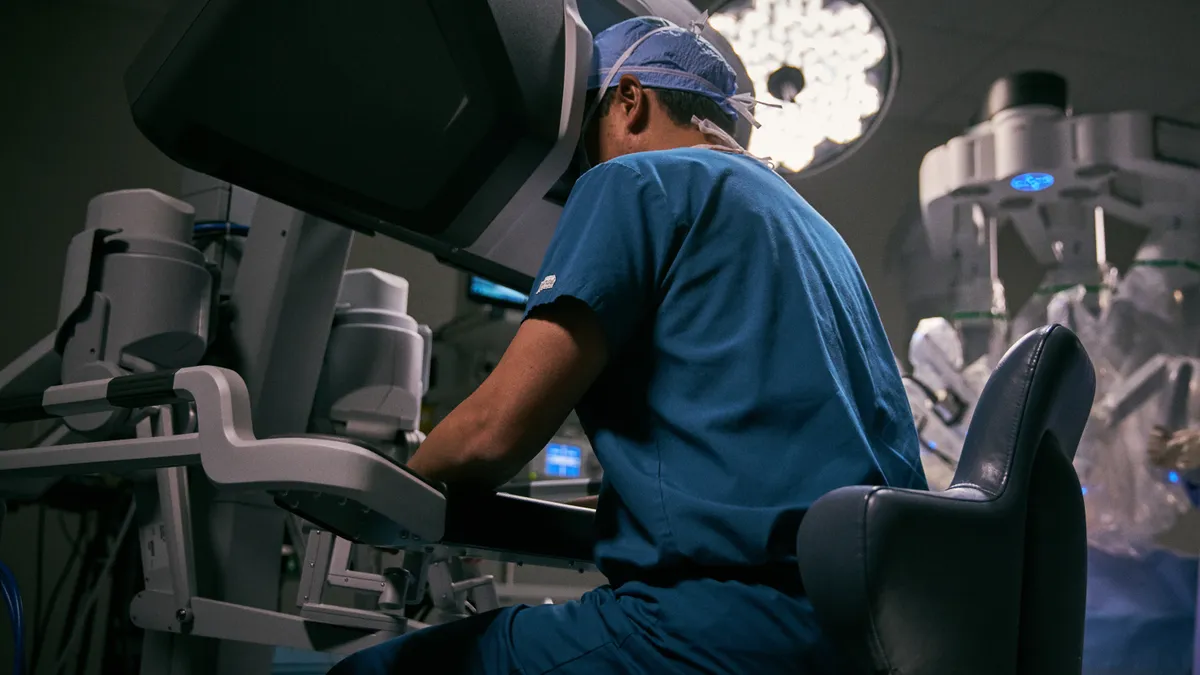Dive Brief:
- After first-quarter earnings reports this week by other medtech companies pointed to a rebound in procedure volumes, Intuitive Surgical saw better-than-expected results. The surgical robotics company reported procedures were up 19% compared to the first quarter of 2021, beating Wall Street's expectations of a 12% increase. It was also a double-digit increase from 2019, when the COVID-19 pandemic didn't weigh down on hospital staffing or capacity.
- For the full year of 2022, Intuitive raised its guidance for procedure growth of 12% to 16%. While placements of its surgical robotic systems were up overall compared to last year, management on Thursday warned of some slowing in the U.S. In total, the company installed 311 da Vinci systems, growing its base by 13%, but coming in below expectations. In the U.S., the company installed 186 systems, slightly fewer than the 190 system placements in the first quarter of last year.
- Intuitive expects slightly higher operating expenses and slightly lower profit margins going into 2022, as a result of supply chain costs and inflation. The company adjusted the bottom of its guidance and now expects operating expenses to increase between 23% and 27%, and gross profit margins of 69% to 70.5% of net revenue.
Dive Insight:
Despite beating expectations for procedures, revenue and net income, Intuitive's stock dropped nearly 11% on Friday, as company leadership cautioned about slowing placements in U.S. hospitals and supply chain challenges.
Intuitive reported revenue of $1.49 billion for the first quarter, a 15% increase compared to the same period last year. The company's net income of $366 million was a 14% decrease from 2021, but still came in ahead of consensus estimates.
In the U.S., procedures recovered as the wave of COVID-19 cases driven by the omicron variant abated. They were up 16% compared to the first quarter of 2021, and were still up 13% from 2019. The increase was driven by bariatrics procedures, hernia repair and cholecystectomies, or gallbladder removals, CFO Jamie Samath said in a Thursday earnings call.
As COVID-19 cases in China are surging during a new wave, Intuitive started to see procedures impacted in March and continuing into April.
"China is our second biggest marketplace, but it's still a relatively small proportion of overall procedures," Samath said, adding that the U.S. makes up about 70% of global procedures.
"COVID still remains a bit of a wildcard in selected APAC regions, but ultimately China only represents 5% of total procedures and it's clear that momentum in other areas is clearly capable of more than offsetting," analysts with Truist Securities wrote in a research note.
The positive news about procedures were offset by comments cautioning about supply chain challenges, though they didn't have a material impact on Intuitive's business, and slowing device placements.
In the U.S., Intuitive placed 186 systems in the first quarter, slightly less than the 190 in the same period last year. BTIG analysts noted that some factors going into this included hospital staffing shortages, rising interest rates and a slowing trade-in cycle, which allowed customers to upgrade their da Vinci machines for newer models.
Ultimately, Intuitive ended the quarter with a smaller funnel of customers than at the start of 2022. The reason behind this isn't entirely clear. Intuitive CEO Gary Guthart said it could be because of a "pull forward" in demand as hospitals spent down their budgets at the end of the year. This would be less worrisome than an overall tightening of hospital finances, Truist analysts wrote.
"We don't know yet," Guthart said in the earnings call, adding that procedure demand is a core driver of placements. "Our major focus is making sure that we can supply the customer with what they need in a way that's high quality and timely, so it's really managing supply chain. If that goes well and we are successful in closing those gaps, I think capital demand will will work itself out."











